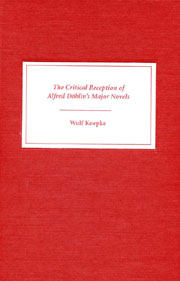Conclusion
Published online by Cambridge University Press: 05 February 2013
Summary
THERE ARE TWO “SCHOOLS” among Döblin scholars; one of them calls him a “Proteus” and emphasizes the changes in his views and in the nature of his texts. The second maintains that, in spite of these undeniable changes, he always remained the same. This is only the first indication how varied the views on Döblin and his oeuvre have been. From the first reviewers to the most recent scholars, hardly anyone writing on Döblin remains neutral. As he himself liked debates and controversy, his texts still elicit a partisan response, pro or con. He still causes emotional reactions with his manner of writing, he baffles with the inconclusive outcome of his narratives, and his philosophy of nature, his political views, and his religious beliefs remain controversial. It is to be expected, therefore, that the reception of his novels cannot be summed up in a few neat statements.
The difficulties begin with the very use of the term “novel.” Döblin was not happy with it, and would have preferred “epic,” but that would be a misnomer as well. When he called November 1918 an “Erzählwerk,” a narrative work, he may have found the best term — but then, this is a vague generic term that includes everything that is narrated.
Critics have not missed the point that Döblin's narrative works had a message, some of them a rather didactic message at that.
- Type
- Chapter
- Information
- The Critical Reception of Alfred Döblin's Major Novels , pp. 218 - 222Publisher: Boydell & BrewerPrint publication year: 2003

